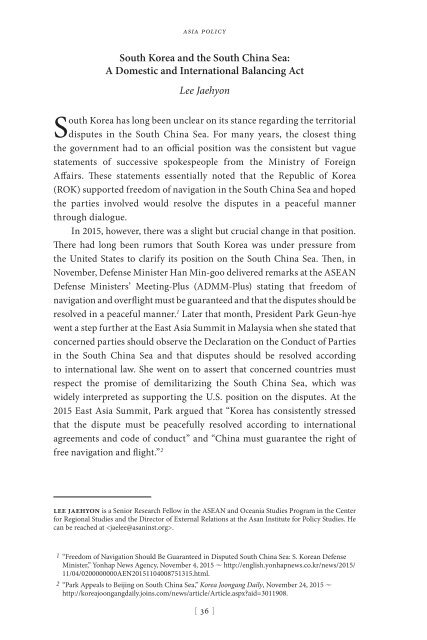Create successful ePaper yourself
Turn your PDF publications into a flip-book with our unique Google optimized e-Paper software.
asia policy<br />
South Korea and the South China Sea:<br />
A Domestic and International Balancing Act<br />
Lee Jaehyon<br />
South Korea has long been unclear on its stance regarding the territorial<br />
disputes in the South China Sea. For many years, the closest thing<br />
the government had to an official position was the consistent but vague<br />
statements of successive spokespeople from the Ministry of Foreign<br />
Affairs. These statements essentially noted that the Republic of Korea<br />
(ROK) supported freedom of navigation in the South China Sea and hoped<br />
the parties involved would resolve the disputes in a peaceful manner<br />
through dialogue.<br />
In 2015, however, there was a slight but crucial change in that position.<br />
There had long been rumors that South Korea was under pressure from<br />
the United States to clarify its position on the South China Sea. Then, in<br />
November, Defense Minister Han Min-goo delivered remarks at the ASEAN<br />
Defense Ministers’ Meeting-Plus (ADMM-Plus) stating that freedom of<br />
navigation and overflight must be guaranteed and that the disputes should be<br />
resolved in a peaceful manner. 1 Later that month, President Park Geun-hye<br />
went a step further at the East Asia Summit in Malaysia when she stated that<br />
concerned parties should observe the Declaration on the Conduct of Parties<br />
in the South China Sea and that disputes should be resolved according<br />
to international law. She went on to assert that concerned countries must<br />
respect the promise of demilitarizing the South China Sea, which was<br />
widely interpreted as supporting the U.S. position on the disputes. At the<br />
2015 East Asia Summit, Park argued that “Korea has consistently stressed<br />
that the dispute must be peacefully resolved according to international<br />
agreements and code of conduct” and “China must guarantee the right of<br />
free navigation and flight.” 2<br />
lee jaehyon is a Senior Research Fellow in the ASEAN and Oceania Studies Program in the Center<br />
for Regional Studies and the Director of External Relations at the Asan Institute for Policy Studies. He<br />
can be reached at .<br />
1 “Freedom of Navigation Should Be Guaranteed in Disputed South China Sea: S. Korean Defense<br />
Minister,” Yonhap News Agency, November 4, 2015 u http://english.yonhapnews.co.kr/news/2015/<br />
11/04/0200000000AEN20151104008751315.html.<br />
2 “Park Appeals to Beijing on South China Sea,” Korea Joongang Daily, November 24, 2015 u<br />
http://koreajoongangdaily.joins.com/news/article/Article.aspx?aid=3011908.<br />
[ 36 ]


